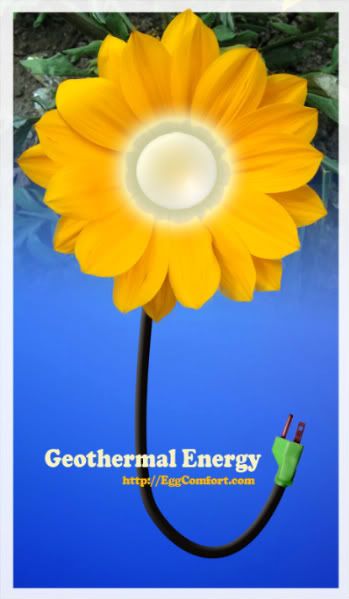Several years ago Jay was interviewed by Michael Dunn, a writer for Tampa Tribune. We've come a long ways since that interview so long ago, but I thought I would share the article as a remembrance for the progress we've made.
"The first time I heard the term “earth loops,” I figured it was some nutty new breakfast cereal
for the granola crowd. ”How about a hearty bowl of Earth Loops? Oh, sure they taste like truck tires, but they’re crunchy and nutritious, and they won’t hurt the ozone layer!” Well, it turns out I was wrong. (Although I still think they’d be good with milk.)
"Actually, earth loops are components of geothermal technology, which uses the ground as a
heat-exchange medium. Because the ground absorbs energy from the sun and stores it deep beneath the surface, people can tap into that stored energy and use it to heat and cool homes. Here’s how it works: A series of polyethylene pipes filled with ordinary tap water is buried deep underground. (In cold climates, antifreeze may be added to the water.) Using a specially designed heat pump, the water is circulated through the pipes, which form one long, continuous “earth loop.” In the heating mode, the liquid in the pipes is cooler than the ground. In the cooling mode, the soil is cooler than the liquid. Because heat always moves from a warm area to a cooler one, heat is exchanged between them, said Paul Fink, territory manager for WaterFurnace Southeast.
"WaterFurnace introduced the first closed-loop system to South Florida in 1990, and since then
the company has installed about 400 residential units, Fink said. Last month, for example, the company installed a geothermal system at baseball star Dwight Gooden’s St. Petersburg home. The system works – and is energy efficient – because underground temperatures remain constant within geographical locations, he said. In the Tampa Bay area, for instance, the underground temperature is roughly 74 degrees year-round, compared with 70 degrees in the Panhandle and colder as you go north.
"Unfortunately, the up-front costs are expensive – roughly $8,700 for a 3-ton vertical heat-pump system – and that’s one of the reasons builders have shied away from it. “Builders are a little bit scared of it,” said Jay Egg, president of Egg Systems Inc., and Oldsmar company that installs the systems. “But people love it.” Fink put it more bluntly: “If a builder is progressive and concerned about energy and the environment,” he’ll try it. “Unfortunately, most builders don’t fall into that category. How can I put this subtly – they’re cheap as hell.” Palm Harbor builder Mike Connor of Schickedanz Bros. has installed two geothermal systems and said they “seem to work real well. From what we’ve seen, it looks like it offers pretty substantial savings.”
"Geothermal systems work best for heating, so they’re more popular in Northern climates, Egg
said. But the system can save Floridians $40 a month on air-conditioning bills, and because it recycles warm water, a household’s water-heating costs are virtually eliminated, he said. Geothermal systems recoup their costs in five to seven years, and the specially designed heat pump lasts four to five times longer than traditional heat pumps because it is housed indoors, he said. Egg, incidentally, has introduced a new kind of geothermal system to the Bay area in which the earth loops are shaped like a Slinky. They take up less space than traditional straight-pipe geothermal systems, so they can be installed in just about any yard, he said. Those interested in learning more about earth loops can contact WaterFurnace Southeast at (800) 231-5667 or Egg Systems Inc., at (727) 848-7545."









